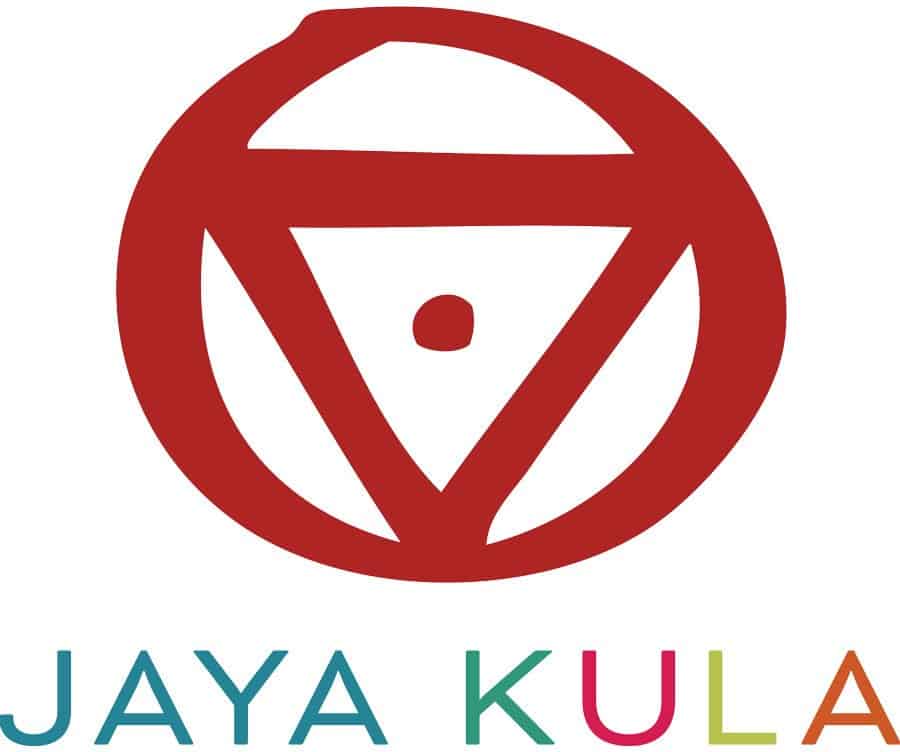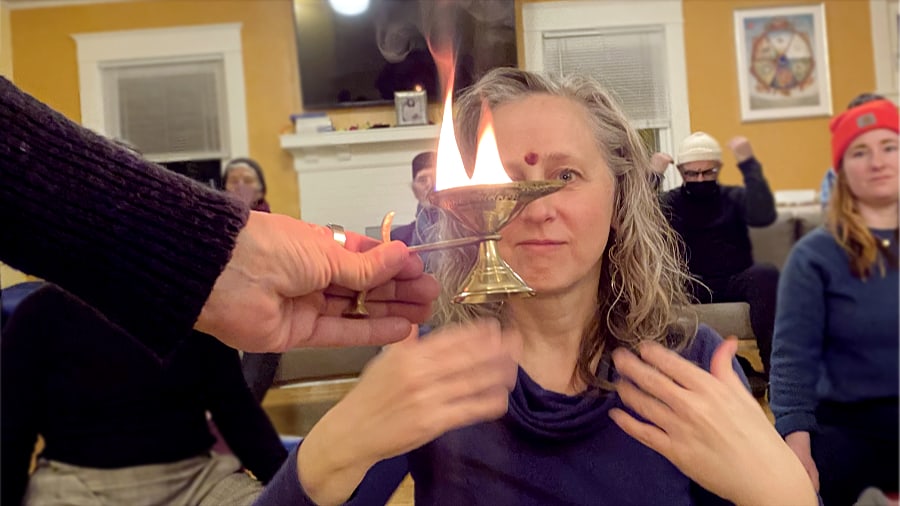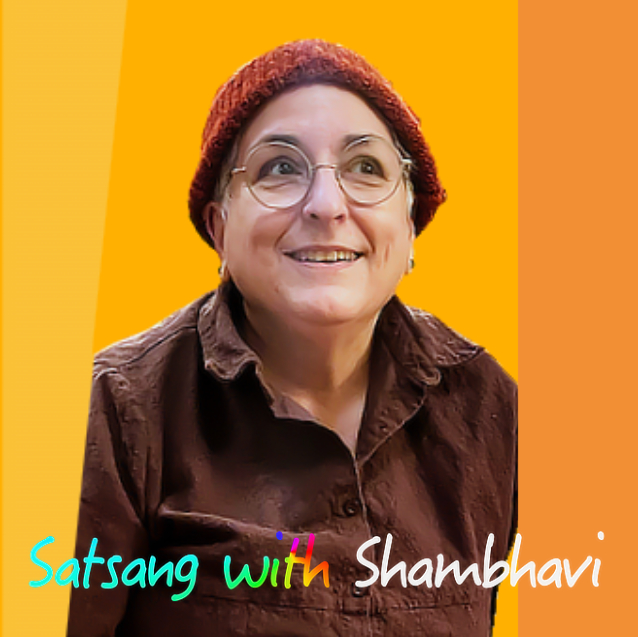When we have the View, we recognize that dishonesty takes us away from our practice and creates vast loneliness. A podcast from Satsang with Shambhavi
SHAMBHAVI
We start satsang with you throwing something out but I actually have something I want to talk about. So now you're going to get that. [laughs]
There's a phrase that's used in Tibetan Buddhist practices and traditions that I've been in, you know mostly like Kagyu, Dzogchen and Nyingma traditions, where you say of someone that they have the View. And it's a little bit different than saying someone's living the View. So these are both phrases that are from Tibetan Buddhism.
When you say someone's living the View, you basically mean they have a high degree of realization and they embody the View.
When you say someone has the View, you mean something more than just that they understand the View in some intellectual way. You mean that they have it, they're holding it in their everyday lives and they're using it and, to some degree, embodying it. But it's more like that's what's guiding them. Their lives are being guided by the View. So that's what it means when someone has the View, or you could say holding the View.
If you are living the View, you don't need to hold the View or have the View. The View has you. [laughs] And as a matter of fact, at the end of the day, there's no View. There's just being in this livingness with open heart and open perceptions and going along in a spontaneous way. So the whole idea of View is not really needed at the end of the day.
But in any case, holding the View or having the View means that you are, first of all, having some experience that gives you confidence in the View. For instance, the basic View that there is only one self here. Or if we were in a Buddhist tradition, everything is nature of mind. It's basically saying the same thing. There's only one, whatever that is here, and we are all aspects of that. And I'm talking about nondual traditions, not other kinds of traditions, obviously.
So in order to have the View in a non-intellectual way, you have to have confidence in it to some degree. Because it's only having confidence in the View that lets you have the tenacity, steadfastness, courage, and persistence to continually try to hold that during your everyday life at all times. So the effort to remember the View, to reinvoke the experience of your practice.
In a sense, we could say having the View means being in the state of your practice and remembering to do that and trying to do that and trying to do that. Because you understand that whatever the state of your practice is, that is more of a fullness of the experience of reality than whatever you're doing the rest of the time.
So the rest of the time, when we're not having the View, what are we doing? We're following karmic patterns. We're just more or less being driven around by our karmic patterns. When we don't have the View, we don't make the effort to have the View.
So when we don't have confidence in it, when we don't really grok the value of it, then we don't make the effort to have the View much of the time. And that's where we get all kinds of justifications for compartmentalizing our lives.
You know, when people come to me and say something that's actually, to me, quite comical—I was feeling really badly, so I didn't do my practice. So that could take a whole satsang to unpack. Or, I had company for the weekend, so, you know, I just did all these things, and I just forgot about being a practitioner for the weekend because I had company, you know. You know how it is.
So when we don't have the View, then we can make those kinds of arguments to ourselves and they make sense. When we have the View, even though we might still want to not do our practice sometimes or want to just forget about it sometimes or want to not make the effort to remember it sometimes, we have this little, like, ping go off inside of us. It's that ping of knowing from the heart that there really isn't anything else that tops this. Right? We understand there's nothing that tops this.
So even though we still feel our karmas chugging along, we're like, oh yeah, okay, ping. That's what it means to have the View. It's like living inside of us. We're not enlightened or anything, but we have some direct experience that—we have enough confidence in, that when we're going along toward whatever we normally do in our ordinary way, that we get pinged. Something reminds us, and then we can try to integrate our experience as practitioners into our everyday lives.
The most condition that we find ourselves in when we don't have the View is that we are able to be dishonest with ourselves and other people. So this talk is actually about honesty and how having the View and getting that ping to be in View, to be in the state of our practice, to reinvoke that. And it's an effort. Sometimes it's really an effort.
Sometimes it comes on spontaneously and we just find ourselves sailing along smoothly, being in the state of our practice. We're just walking down the street and all of a sudden it's like, whoa, okay. I'm in the state of my practice. Other times we're walking down the street and our minds are chugging along thinking of past, present, future, arguing with people in our minds, feeling really sad about the same thing we felt sad about for the last 20 years. About something someone said to us 20 years ago.
You know, all the things that we do that we call karma. So sometimes we're just doing that. And then occasionally, the state of our practice just like, boom, visits us. Those are, like, moments of grace. That is grace, basically.
But we can also make efforts to drop back into the state of our practice when we have the View. And that's what we're doing a lot of the time, especially when things are really pulling us along. Like when some karmic thing is upsurging and it's really strong, then we have to make a lot of effort to listen to that ping and go back into the state of our practice and try to deal with things as practitioners instead of as just karmically driven, semi-unconscious beings.
When we have the View, we want to find out how things actually are in general, in the world, and for us. And being dishonest to ourselves and other people, we recognize that that is taking us far away from our practice. We recognize that in dishonesty to ourselves or other people, we are continuing our suffering for even more time, or maybe even making it worse.
So having the View means some contact with wisdom. Like, there's actually more wisdom there when we have the View. And so we understand that dishonesty with ourselves, first and foremost, and then with other people is hurting us. It's hurting us as human beings and as practitioners.
Now, there are many people who will just lie at the drop of a hat without any thought at all. They feel even slightly threatened by something. They don't even recognize what it is. It's just, like, this layer or level of anxiety that gets activated, and then the lies just start coming out. Right?
And I'm using the word lies because they are lies. People are just on dishonesty autopilot. Right? So it may seem harsh to call them lies, but I don't mean that they're always intentional. But they are definitely a very strong pattern for some people. Where the minute any sense of threat comes up, everything, you know...
One way that we lie is we externalize. Everything is the fault of something else, someone else, something else. Or we just feel under threat and we try to convince others that whatever they're seeing or saying is not true. Just basically gaslighting as a way of life.
We can lie to ourselves about our practice and our orientation to it. We can lie to ourselves about what condition we're in generally. We can try to deflect from having to actually look and get down to the ground level about what our condition is and thereby be able to take appropriate practical steps to take care of ourselves.
We can lie about all sorts of things. We can lie about our health, we can lie about our state of mind, we can lie about just about anything that it feels threatening to actually recognize what's going on.
But when we have the View, we understand that none of that has anything to do with the path of self-realization. We also understand that any dishonesty with ourselves or other people is harmful. It's a form of violence against ourselves, first of all, because it prevents us from living the best way we could. It creates a gulf between us and others and between us and ourselves.
So dishonesty is one of the major fuels for loneliness. We can't be intimate with ourselves or anybody else when we're being dishonest about our condition or how things are or what has happened or any of that stuff. So this is all defensiveness. So all this lying is defending against clear seeing about ourselves and taking clear action, having other people see us clearly. And all of that creates vast loneliness.
It's interesting because in this time, so many people say they feel different. Right? Something feels different. I feel different from other people. I realized about six months ago that this almost pervasive feeling is because people are so out of sync with honesty about themselves and with themselves that, yeah, they feel different because they really are different from how they're presenting themselves to themselves and other people.
There's like an out-of-syncness between how you actually are, how you actually feel, what you actually want, how you actually look. You know, whatever it is. And how you are appearing to others and how you are self-fashioning a story about yourself for yourself. And so that creates this disjunct of something just feeling off. You know, I just feel off. It's like you're wearing somebody else's shoes and you're wandering around wondering why your feet feel weird. You know? [laughs] It's exactly like that.
So having the View means that we have some inkling of all of this. We understand and we have a sense of, or a taste of what it feels like to be less contrived and more natural, more honest. And we have grokked the value of that. And we understand there's nothing else more valuable than that.
There's nothing that is going to solve our problems and our feeling of loneliness more than that. We are not going to solve the problem of loneliness by contriving a self that we think other people will want to be around. That's like making a puppet, putting it on a stick. Hi, how are you? [laughs] I'm way back over here. You know, you're just talking to my puppet. How's that going to make me feel less lonely?
So I've been talking about this widespread self-image making that's happening and level of dishonesty that's going on. And I just wanted to say these words because you are paying a very high price for this. A very high price. And it's not going to solve your problem. Right? Again, lying is all defensiveness, whether it's internal or external.
Let's say that you cannot tolerate being found to have made a mistake. So we all make mistakes. God, I mean, seriously, we are the stumblers, par excellence. We just stumble around through our lives, in general. So if you're afraid to be seen making mistakes, you are in deep shit.
And then, every time someone says anything about something that didn't go quite right, you launch into this huge defense. That is just going to make you feel more separate from everyone and from yourself. You're not able to just be a human. And then eventually everyone just gets tired of hearing all your defensiveness and, kind of, okay, oh yeah, I'm not going to talk to that person again because I just don't feel like going through that again.
So you're trying to look like a better person by not having made a mistake. It doesn't work. It just doesn't work. There's nothing more to say about it. It is a complete failure of a strategy. 100% a failure.
So when we have the View, even though we still have these karmic engines chugging along. Even though we might still feel that upsurge of defensiveness and anxiety coming upon us, some of the time we're going to listen to that pang and we're going to realize, okay, right now, right here, I'm making my stand for myself, for my life. And I'm going to try to do whatever I can to bring on my practice to be in the View and to relax.
Just be a human. We're messy. But if we can't be honest, we don't see the value of honesty above and beyond the value of all this contrivance. We really have very little to go on in our lives. Right? So come on in, the water's fine. Get in the pool with everybody else. Even if you're in the shallow end of the pool, at least you're in the pool.
STUDENT 1
On the topic of honesty, I wanted to talk about it because sometimes it's not like things are black or white. Like it's a truth or it's not a truth. Right? Sometimes it takes time for the truth to reveal itself, you might say. Would you say that that's correct?
SHAMBHAVI
Sure, because we're all coming out of a condition of our clarity being obscured. We don't have full access to our perceptions, and each of us has a unique dimension. So each of us has a different degree of access to our perceptions. Yeah, absolutely.
I had this experience when I was younger of going to the movies with other people and always having an opinion the minute the movie was over. You know? [laughs] And getting very frustrated with whoever I went to the movies with when they didn't have an instant way of talking about it. And then over time, you realize, no, it just sometimes takes people more time to, like, absorb, and, you know... So there's a lot of differences in how we all are.
But I think it's not so much about 'the truth' all the time. I'm talking about a much broader definition of, or view of honesty where you're just showing up as you are, rather than showing up in some way that is trying to manipulate others to see you a certain way, or do a certain thing, or trying to assuage your own feelings of anxiety by, like, putting on something. So I'm talking about a degree of naturalness as being honesty. And willing to show up with whatever condition you're in, in the moment.
STUDENT 1
Okay, yeah. I've been told, like, does it need to be said? Does it need to be said now? Does it need to be said by me? It might be the honest truth, but maybe it's not the right moment.
SHAMBHAVI
Honesty doesn't mean we're constantly blurting out everything. One time somebody came to me and said, I want to say this mean thing. They didn't say this, but what they wanted to say to somebody else was mean and unnecessary. And they came to me and said, you know, I want to find a compassionate way to say this. And I was like, no, just don't say it. That's [laughs] the compassionate thing.
So yeah, there's a lot of misconstrual about what honesty means. But certainly we're not going to just spill everything to everyone all the time. We have discernment also, right?
STUDENT 1
Yes. And I like this idea that there's a journey. Sometimes situations have to evolve before clarity comes.
SHAMBHAVI
Absolutely. That's natural. And that's the condition that we're all in. But don't use that as an excuse not to be honest when you actually know what the circumstances—when you actually are seeing clearly. Telling yourself it's for the good of someone else.
But again, I just want to underline that this is not about telling the truth. That's only about 5% of honesty. Right? It's telling the truth with your whole body, energy, and mind and how you're showing up. Not just with your words.
Sign up to receive email updates
Enter your name and email address below and I'll send you periodic updates about the podcast.


